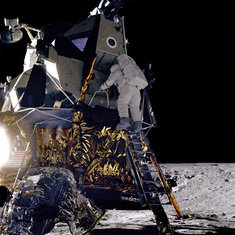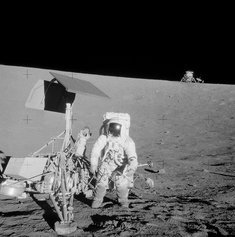4. Glitch
在俚语中指“小故障,小毛病”,严格来说,glitch 是指电流中电压受阻或变化。
5. Garbage
这里可不是我们通常所说的“垃圾”,而是指计算机这一行当所说的“无用数据,无用单元,无用信息”,其实也和垃圾差不多。
6. Straighten out
这个片语的意思是“清理,整理 clear up disorder, a confusion, or a misunderstanding”,例如:This is an awful mess; I hope you'll straighten it out.
Could you straighten out these remarks?
文化面面观
阿波罗12号——没有转播的月球之旅
Apollo 12 was the sixth manned mission in the Apollo program and the second to land on the Moon.

|
| L-R: Conrad, Gordon and Bean |
Crew:
Pete Conrad (此前做过两次飞行), commander
Richard Gordon (此前做过一次飞行), command module pilot
Alan Bean, lunar module pilot
The mission
Shortly after lift-off from Cape Canaveral, the Saturn V rocket body was hit by a bolt of upper-atmosphere lightning. The CM's instruments momentarily went off-line and Mission Control lost the telemetry feeds from the spacecraft for several seconds. When ground control regained telemetry lock with the spacecraft, the feeds were garbled and reported incomplete and possibly inaccurate information. EECOM John Aaron thought that the garbled telemetry might be caused by a malfunction in the launch vehicle's Signal Condition Equipment, since the SCE converted raw instrument data into forms usable by spacecraft instrument displays and ground telemetry equipment, and it would have automatically gone off-line in response to the kind of disruption to the spacecraft's electrical systems that a lightning strike would cause.
 |
| Alan Bean descends from the LM. (NASA) |
With this in mind, Aaron suggested the crew "Try SCE to aux" – thereby forcing the Signal Condition Equipment to switch over to its auxiliary power source and bringing the SCE back on-line. The command was a relatively obscure one and neither the Flight Director, CAPCOM, or Mission Commander Conrad could immediately recall how to implement it; however, LMP Al Bean remembered that the SCE switch was on his panel because of a training incident a year prior to launch where just such a failure had been simulated. Aaron's quick thinking and Bean's memory were able to salvage what otherwise would have been an aborted mission (at the time of the failure, the flight had just entered abort mode One Bravo). With telemetry restored, the crew proceeded to parking orbit and was able to fully restore and verify the functionality of their spacecraft before re-igniting the S-IVB third stage for trans-lunar injection.
The S-IVB was originally intended to be put into a solar orbit by venting the remaining propellant. However, an extra long burn of the ullage motors meant that venting the remaining propellant in the tank of the S-IVB did not give the rocket stage enough energy to escape the Earth-Moon system and instead the stage ended up in a semi-stable orbit around the Earth after passing by the Moon in November 18, 1969. It finally entered into solar orbit 1971, but returned to Earth orbit (briefly) 31 years later. It was discovered by amateur astronomer Bill Yeung and he gave it the temporary designation J002E3 before it was determined to be an artificial object.

|
| Bean, Surveyor 3 and the LM Intrepid (NASA) |
The Apollo 12 mission landed on an area of the Ocean of Storms that had been visited earlier by several unmanned missions (Luna 5, Surveyor 3, and Ranger 7). The International Astronomical Union, recognizing this, christened this region Mare Cognitium (Known Sea). The landing site would thereafter be listed as Statio Cognitium on lunar maps (Conrad and Bean did not formally name their landing site, interestingly enough, though the intended touchdown point was nicknamed Pete's Parking Lot by Conrad).
The second lunar landing was an exercise in precision targeting. The descent was automatic, with only a few manual corrections by Conrad. Although Apollo 11 had made an almost embarrassingly imprecise landing well outside the designated target area, Apollo 12 succeeded, on November 19, in making a pin-point landing, within walking distance (less than 200 meters) of the Surveyor 3 probe, which had landed on the Moon in April 1967.
To improve the quality of television pictures from the Moon, a color camera was carried on Apollo 12 (unlike the monochrome camera that was used on Apollo 11). Unfortunately, when Bean carried the camera to the place near the lunar module where it was to be set up, he inadvertently pointed it directly into the Sun, destroying the vidicon tube. Television coverage of this mission was thus terminated almost immediately.
影片对白 Maybe we weren't dignified enough to be heroes. It wouldn't matter. 'Cause we were the second mission to land on the moon. History's ultimate anticlimax.
考考你 小试牛刀